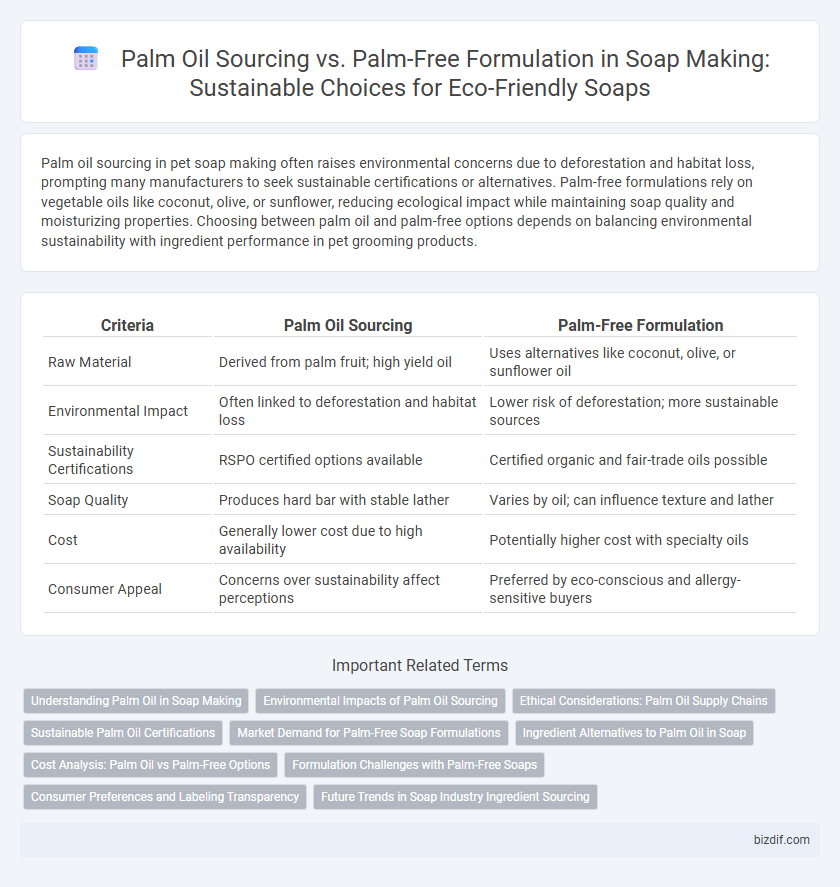Palm oil sourcing in pet soap making often raises environmental concerns due to deforestation and habitat loss, prompting many manufacturers to seek sustainable certifications or alternatives. Palm-free formulations rely on vegetable oils like coconut, olive, or sunflower, reducing ecological impact while maintaining soap quality and moisturizing properties. Choosing between palm oil and palm-free options depends on balancing environmental sustainability with ingredient performance in pet grooming products.
Table of Comparison
| Criteria | Palm Oil Sourcing | Palm-Free Formulation |
|---|---|---|
| Raw Material | Derived from palm fruit; high yield oil | Uses alternatives like coconut, olive, or sunflower oil |
| Environmental Impact | Often linked to deforestation and habitat loss | Lower risk of deforestation; more sustainable sources |
| Sustainability Certifications | RSPO certified options available | Certified organic and fair-trade oils possible |
| Soap Quality | Produces hard bar with stable lather | Varies by oil; can influence texture and lather |
| Cost | Generally lower cost due to high availability | Potentially higher cost with specialty oils |
| Consumer Appeal | Concerns over sustainability affect perceptions | Preferred by eco-conscious and allergy-sensitive buyers |
Understanding Palm Oil in Soap Making
Palm oil serves as a key ingredient in soap making due to its unique fatty acid composition, which contributes to hardness and lather quality. Understanding sustainable palm oil sourcing is critical to minimizing environmental impact and supporting responsible agriculture practices. Alternatively, palm-free formulations rely on substitutes like coconut or olive oil to maintain soap performance while addressing ethical and ecological concerns.
Environmental Impacts of Palm Oil Sourcing
Palm oil sourcing for soap making contributes significantly to deforestation, habitat destruction, and increased greenhouse gas emissions, posing severe threats to biodiversity and climate stability. The expansion of palm plantations often leads to the loss of critical rainforests and peatlands, which are essential carbon sinks. Opting for palm-free formulations reduces the environmental footprint by avoiding these ecological damages while promoting sustainable alternatives like coconut oil or shea butter.
Ethical Considerations: Palm Oil Supply Chains
Palm oil sourcing in soap making often raises ethical concerns due to deforestation, habitat destruction, and labor rights violations linked to conventional supply chains. Palm-free formulations eliminate these risks by using alternative oils, supporting biodiversity preservation and fair trade practices. Sustainable palm oil certifications like RSPO aim to improve transparency and social responsibility within the palm oil industry.
Sustainable Palm Oil Certifications
Sustainable palm oil certifications such as RSPO (Roundtable on Sustainable Palm Oil) and ISCC (International Sustainability and Carbon Certification) ensure responsible sourcing by promoting environmentally friendly and socially equitable practices in palm oil production. Soap makers opting for certified sustainable palm oil contribute to reducing deforestation, preserving biodiversity, and supporting local communities. Conversely, palm-free formulations address environmental concerns by eliminating palm derivatives altogether but require careful ingredient selection to maintain similar soap qualities and sustainability standards.
Market Demand for Palm-Free Soap Formulations
The market demand for palm-free soap formulations is rapidly increasing as consumers prioritize sustainability and environmental responsibility in their purchasing decisions. Palm-free soaps appeal to eco-conscious buyers concerned about deforestation, biodiversity loss, and the carbon footprint associated with palm oil production. This shift encourages manufacturers to innovate with alternative oils such as coconut, olive, and shea butter to meet the growing preference for ethical and sustainable soap products.
Ingredient Alternatives to Palm Oil in Soap
Palm oil is widely used in soap making for its lathering and moisturizing properties, but sustainable sourcing remains a significant concern due to deforestation and habitat loss. Palm-free soap formulations often substitute ingredients like coconut oil, olive oil, shea butter, and sunflower oil to replicate similar cleansing and conditioning effects. These alternatives provide eco-friendly and vegan options, preserving soap quality while supporting ethical production practices.
Cost Analysis: Palm Oil vs Palm-Free Options
Palm oil sourcing offers a cost-effective raw material for soap makers due to its widespread availability and lower price compared to many palm-free alternatives such as coconut oil or shea butter. However, palm-free formulations often incur higher production costs driven by specialty ingredient procurement and supply chain variability. Despite the initial expense, palm-free soaps can command premium pricing owing to growing consumer demand for sustainable and deforestation-free products.
Formulation Challenges with Palm-Free Soaps
Formulating palm-free soaps presents challenges such as achieving a stable lather and hardness comparable to palm oil-based soaps, which naturally contribute to firmness and longevity. Alternative oils like coconut, olive, and shea butter often require precise blending to replicate the desirable texture and moisturizing qualities. Balancing cost, sustainability, and performance remains critical in developing effective palm-free soap formulations for consistent consumer satisfaction.
Consumer Preferences and Labeling Transparency
Consumers increasingly prioritize ethically sourced palm oil in soap making due to environmental concerns and social responsibility. Transparent labeling that clearly distinguishes palm oil origin or absence enhances brand trust and influences purchasing decisions. Palm-free formulations appeal to eco-conscious buyers seeking sustainable alternatives without compromising product quality.
Future Trends in Soap Industry Ingredient Sourcing
The soap industry is increasingly shifting towards sustainable palm oil sourcing certified by RSPO to reduce deforestation and support ethical supply chains. Palm-free formulations gain traction through alternative oils like coconut, sunflower, and shea butter, catering to eco-conscious consumers avoiding palm-derived ingredients. Future trends emphasize transparency, blockchain tracking, and innovation in renewable, cruelty-free ingredients to meet stringent environmental standards and consumer demand.
Palm Oil Sourcing vs Palm-Free Formulation Infographic

 bizdif.com
bizdif.com